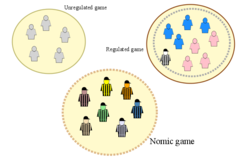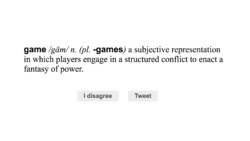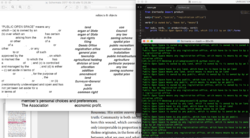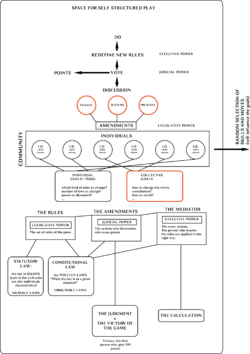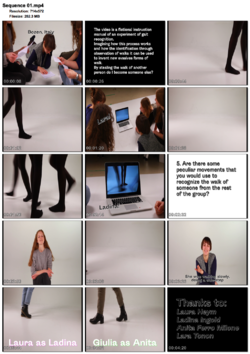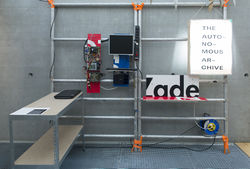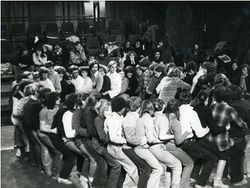User:Giulla/Graduation Proposal GdG
What do you want to make?
For my graduation project I’m working on designing a game that questions the value of law domination and explore practices of active-collaboration within a playground setup. My research and practice got very inspired by the discovery of “Nomic, a Game of Self Amendment”[1], and it is used as reference for the concept of the game I will build. This game, invented by Peter Suber, is based on the axiom that changing the rule of the game is a move in the game itself. The gameplay involves propositions of amendments to the set of existing regulations and a random points system as score to approve the amendments. As in Nomic, I’m interested in creating a game as system that allows improvisations within their regulations and predefined roles. Showing how fragile systems (as the law for examples) are when confronted with a group of individuals, a community, that acts and behave within this system. To push my game in a different direction from Nomic, I want to add an extra layer of roles: as in RPG games (role player games) the players are characterized by individual features and skills. These characteristic will influence the movements and strategies of the players during the game: the players under specific power constraints will act and try to bend the regulations of the game by their own will or the collective will. The game will act act as playground for the creation of a fictional macro-society: a group of individuals that forms a community and behave under constitutional constraints while experience particular privileges or oppressions.
'“Public institutions such as the law or commerce, which proceed in and by agreements among their participants, public and private institutions such as governments, clubs, corporations, and universities, are all characterized by the way their participants and stakeholders make and remake the rules of play, and sometimes challenge or avoid them.” [2]
How do you plan to make it?
I think the form of the game is the best option to communicate my research on conflictual participation. However, I don't want to exclude possibilities of extending the project in different forms. I'm still very interested in using the game as platform for physical action and dramaturgy. Possibilities that could generate different narratives and readings.
Here a small description of the characteristic of the game and how I’m planning to build it:
What's the concept of the game?
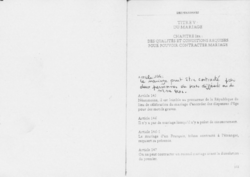
The game is designed to play and explore group social dynamics. It is staged to challenge how individuals are able to collaborate with each other and commit to certain goals. It looks at how individual self-interests can or cannot be combined together in order to achieve goals. I like the idea of thinking about the game as a game of changing/re-writing/choreographing the rules of the game itself. A game of lawmaking. The players though have to stick to certain roles. The roles are some sort of “hegemonic” fixed set of behaviors and characteristics that represent some standard figures that can appear in social formations. The mechanic of the game is set to allow changments of the rules it self by the players. The players have to combine their skills and characteristic in order to modify / temporarily suspended / preserve / the rules of the game. A judge (which is also called the mediator) will decide through a voting system if the modifications of the laws performed by the collective of players will be voted in. Every player receive a card with a goal. The game ends when someone scores 100 points (the value system still needs to be defined better…). The points will look at the specificities of the players, their I.D. cards and will based the score onto them.
What's the goal of the game?
I think there' still a lot of work to be done on defining the main goal of the game, but until now I'm imagining that, as in Nomic games, the main rule is to change the rules itself and be able to defend your proposition of changement. I want to focus the game on questioning the transcendence of law while allowing certain degrees of freedom and constraints. The game wants to show how individuals reacts under certain conditions of "political" freedom (through the distribute power of law-making) and social constraints (through the "imposed" roles).
What's the audience?
The audience of the game can be a multiple variety of adults with passion for discussion and interest in the questions I'm arising with the game. My plan is to simplify as much as possible the form and narrative of the game, revealing complexities through metaphors and fictions. I hope then to become able to involve as many people as possible, with different interests and personalities. As the game wants to show and play with the regulations of being together, I think the only necessary requisite would be to be open to possible situations of conflict and discussion.
Which devices/components am I going to use?
- I.D. cards / role cards for the characters: random generated cards with a set of skills and moves.
- Mission cards: individual goals
- The Constitution: series of cards with regulations.
- Selected spaces (on a board or in the physical space of a room) where certain rights and/or political systems will cease to have effect (areas of exceptions, like dictatorships)
- Value system of points for the rule changment (still needs to be defined...)
I.D. Cards
I wrote a draft of a small list of possible characters that could be source materials for the generation of the I.D. cards.
The shy:
- he HIDES and OBSERVE,
- he lives at the MARGINS
- when he doesn’t like something he ESCAPES
his skills are:
- CAMOUFLAGE
- ESCAPISM
- FOLLOW SOMEONE / shadow movement
- DE-SYNCHRONIZED
his moves are:
- Refuse to answer
- Refuse to vote
- Refuse to express opinion
- OBSERVE
The altruist:
- he HELPS always the others
- he has CONFUSED IDENTITY
his skills are:
- STOPS and support someone in difficulty
- he often CHANGES IDEA and PLAN conforming the situation
- SLOW
- CAREFUL
- PRECISE and ACCURATE
- DEVOTED
- he seeks for CONTACT and CLOSENESS
- LOVING
- OBSERVE
his moves are:
- help
- support
- understand
- interpret
- supports other’s opinions and choices
The dominant
- he likes to see things CHANGING as he wants
- he’s often DISCONNECTED to the rest of the people
- he’s AUTHORITARIAN and often ANGRY
his skills are:
- DE-SYNCHRONIZED
- LOUD
- REPRESSIVE
- CLUSMY
his moves are:
- OVERSTEP
- INTERFERE
- DENY
- don’t ask, PRETEND
The influencer
- he’s CHARISMATIC and always READY
- he can CATALYSE attention and CHANGEMENT
- he’s a GOOD MANIPULATOR of CONSENT
his skills are:
- ECLECTIC
- EASY TO IMITATE
- EMOTIONAL
- CHARMING
his moves are:
- use of sense of HUMOR
- SIMPLICISTIC RHETORIC
- INCLUDE
- EXPRESS ALWAYS OPINION
The fast
- he’s SMART
- he’s AUTONOMOUS
- he’s SYNCHRONIZED and MOBILE
- he’s easily ADAPTABLE
- he NEVER REJECTS, he adapts
his skills are:
- FLUID
- FAST
- FLEXIBLE
- QUICK
- SHARP
- RESILIENT
his moves are:
- RUN
- ADAPT
- FORGET
- PROPOSE ALTERNATIVES
The cheater
- he often MISREAD THE RULES
- he IGNORES the others and others needs
- he ABSTAIN from having an opinion
- he CHANGES IDEA very often
his skills are:
his moves are:
- HIDE
- LIE
- BLUFF
- TROLL
What's your timetable?
- October-November-11/12: play and test different games, prototype my game, write multiple scenarios, variations and possibilities.
- 11/12-10/01: prototype and test the game, with multiple audience. Make interviews and document with videos.
- January-February: continue the documentation of the prototyping, experiment possible outputs + design
- March-April-May-June: finalizing the game, design of the game, write the instructions, test it in few selected environment (maybe creation of one performance, with professional actors playing)
Why do you want to make it?
Making this project and working on the game is an attempt to question the value of law domination and show how the application of law in society is contextual. The "do's and don'ts" of the proper laws have to face another form of self-regulated rhetoric (of the "immune laws"[3]) : forms of community based regulations that protects the commons. In order to answer these questions, I want to stage a game as an opportunity to explore on a macro-scale how individuals are able to compete and enjoy possibilities of shaping power structures. I want to create a playground to experiment with super-imposed set of rules, values and decision making structures and show which kind of emotional infrastructures individuals stage as improvised reaction to these disciplinary paradigms of order.
I think considering our current political panorama, and considering the disappearance of public spaces of commons, there’s a fundamental necessity of claiming the “extra-categorical” that will produce new spaces of freedom. How to turn our bio-politics into affirmative politics of communities.
Who can help you and how?
- Varinia Canto Vila, choreographer and dancer, who works on the concept of body as place of mediation between super-imposed regulations and personal will: http://www.workspacebrussels.be/nl/artists/on_stage/varinia_canto_villa-102.html,
- My friends and people from Poortgebouw, as people who will test the game and perform it,
- Les Gens d'Uterpan, choreograhers from Paris, working and researching on questioning conventions and norms of the "living spectacle" (the daily societal life): http://www.lesgensduterpan.com/,
- Various communities of gamers and RPG players,
- All the teachers.
Relation to previous practice
This project will connect with almost all of the projects I have been done before.
- critics on relation public sphere and individuals : choreography of identitarian control (https://pzwiki.wdka.nl/mediadesign/1st_Final_Essay:_Choreography_of_Identitarian_Control), works on gait analysis and biometrics of surveillance (“adopt a walk”, “DIY gait analysis” https://pzwiki.wdka.nl/mediadesign/2nd_Final_Essay: , https://issue.xpub.nl/02/[4])
- reflection on legality / illegality relation : autonomous archive project (https://pzwiki.wdka.nl/mediadesign/Autonomous_Archive)
- use of gaming techniques as ways to perform an issue: Op=Op
Relation to larger context

"Participation is not only a consultation on policies" [5]
Our life as individuals in society cannot exist without collective organization. The collectivity is protected by societal laws that cannot prevent conflicts. Law is necessary but at the same time impossible to apply in a non-oppressive way. The project grows from a necessity of criticizing the structure of law, normativity and participation. Inspired by the agonistics theory of Chantal Mouffe, this project would be an attempt to interpret a common space as a space for conflict. How do conflict, collaboration and regulations work together?
In particular, I'm looking at performances theatre-like from the Theatre of the oppressed, street actions (the work of Jochen Gerz[6]) and radical games (Molleindustria games[7]).
References
Books
- Agamben G. (2005), State of Exception, Chicago, The University of Chicago Press;
- Boal A. (2002), Games for Actors and Non-Actors, London and New York, Routledge;
- Esposito R. (2011), Immunitas The Protection and Negation of Life, Cambridge and Malden, Polity Press;
- Lomme F. (2017), Onomatopee 75 Research Project, Amsterdam, Onomatopee;
- Mouffe C. (2013), Agonistics, London and New York, Verso;
- Miessen M. (2010), The Nightmare of Participation, Berlin, Sternberg Press;
- Schelling T.C. (2011), The Strategy of Conflict, Cambridge, Mass, United States, Harvard University Press;
- Vigier A, Apertet F., Quinz E. (2017), Uchronia, Berlin and Paris, Sternberg Press;
Articles
- Schechner R., Chatterjee S., Boal A. (1998) "Augusto Boal, City Councillor: Legislative Theatre and the Chamber in the Streets: An Interview" in TDR (1988-), Vol. 42, No. 4 (Winter, 1998), pp. 75-90
- ↑ http://legacy.earlham.edu/~peters/nomic.htm
- ↑ https://www.balisage.net/Proceedings/vol3/html/Piez01/BalisageVol3-Piez01.html
- ↑ https://books.google.nl/books/about/Immunitas.html?id=-WfAby-lkEUC&redir_esc=y
- ↑ https://vimeo.com/207774872
- ↑ https://mellonseminaremotions.wikispaces.com/file/view/Boal+Agusto-Theatre+of+the+Oppressed.pdf
- ↑ https://www.jochengerz.eu/works
- ↑ https://www.youtube.com/watch?v=12D5rxWAD4g

